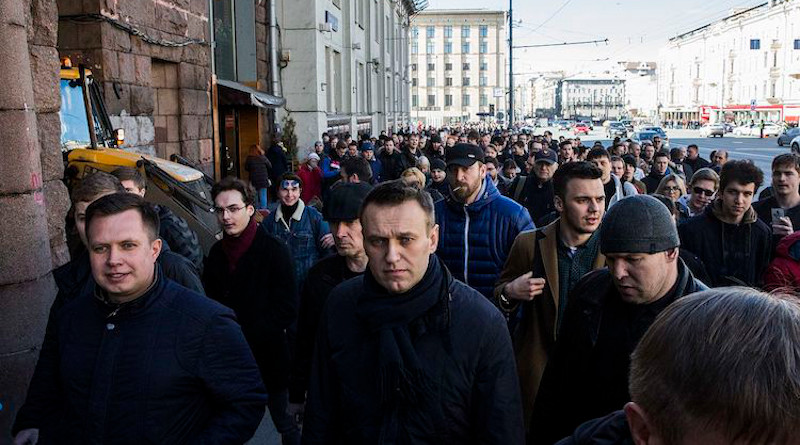Russia: Navalny’s Organizations Banned Ahead Of Election
By RFE RL
(RFE/RL) — A Russian court on June 9 declared organizations linked to imprisoned opposition politician Aleksei Navalny “extremist,” the latest move in a campaign to bar the Kremlin critic’s allies from running in parliamentary elections in September.
The Moscow City Court’s ruling came into force immediately, preventing people associated with Navalny’s Anti-Corruption Foundation (FBK) and his network of regional political offices across Russia from seeking public office.
The ruling also carries lengthy prison terms for activists who have worked with the organizations.
Russian authorities have ramped up pressure on dissent ahead of the election in September, with opinion polls showing support for the ruling United Russia party waning.
Navalny, the most vocal political foe of President Vladimir Putin, was arrested in January upon returning from Germany, where he spent five months recovering from a nerve agent poisoning that he blames on the Kremlin — an accusation that Russian officials reject.
Navalny was sentenced in February to 2 1/2 years in prison for violating the terms of a suspended sentence from a 2014 embezzlement conviction widely considered politically motivated. In April, tens of thousands of people protested for the release of Navalny, following similar mass protests in January against his arrest.
The prosecution in Moscow claimed that “under the guise of liberal slogans” Navalny-linked organizations are “engaged in creating conditions for destabilizing the social and socio-political situation.”
Defense lawyer Yevgeny Smirnov said during the hearing that the prosecutors’ motion was intended to bar Navalny’s associates from running for public office.
“This case has been linked to the law that bans all those who are connected with the FBK from getting elected,” Smirnov said. He said they would appeal the ruling, which was made in a closed-door court session on the grounds that classified materials would be discussed.
Ahead of parliamentary elections, Russian lawmakers pushed a new law that banned members of organizations declared extremist from running for public office.
The law, endorsed by Putin on June 4, bars leaders and founders of organizations declared extremist or terrorist by Russian courts from running for elective posts for a period of five years. Other members or employees of such organizations will face a three-year ban.
Navalny’s foundation has relentlessly targeted senior government officials over the past decade with widely watched videos that expose alleged corruption. His political network has been instrumental in implementing a Smart Voting strategy — a project designed to promote candidates most likely to defeat Kremlin-linked figures.
Dozens of the network’s offices in Russian regions already shut down in April after the prosecutors issued an injunction to suspend their activities pending the court’s ruling.
On Instagram, a message posted after the court ruling on Navalny’s behalf urged Russians to participate in the Smart Voting initiative while acknowledging his organizations will need to “adapt.”
“We will not retreat from our goals and ideas. This is our country and we have no other,” the message said.
The United States and Britain condemned the ruling, the latest development likely to fuel greater tensions between the West and Moscow.
“It is another Kafka-esque attack on those standing up against corruption and for open societies, and is a deliberate attempt to effectively outlaw genuine political opposition in Russia,” British Foreign Secretary Dominic Raab said in a statement.
The U.S. State Department said the court ruling “puts staff members, volunteers, and thousands of supporters across Russia at risk of criminal prosecution and imprisonment for exercising fundamental human rights guaranteed by the Russian Constitution.”
“With this action, Russia has effectively criminalized one of the country’s few remaining independent political movements,” State Department spokesperson Ned Price said, again calling for Navalny’s release from prison.

